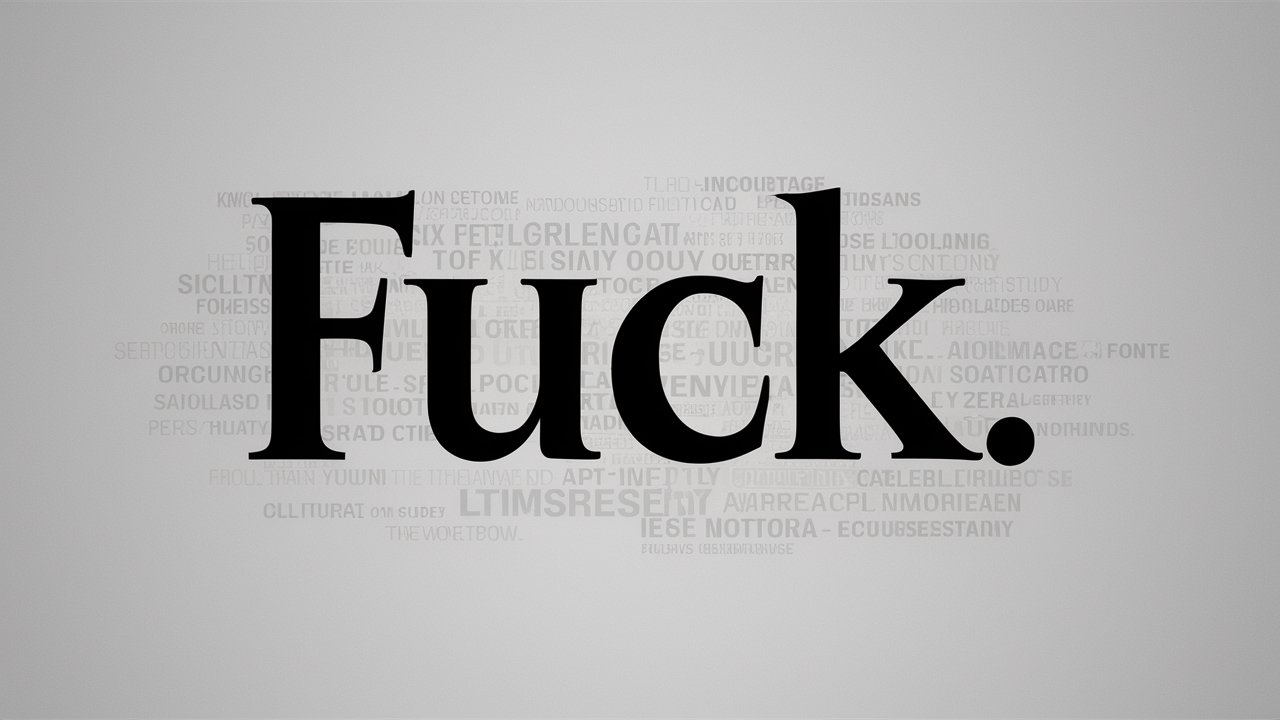Table of Contents
ToggleIntroduction
The word “fuck” may well have a prevalent place among swearwords and be the most debatable term of English speaking universe. The history of poverty goes back many centuries; moreover, the threads that define poverty have changed over time.
Taboo and Controversy
You could consider a “fuck” very naughty and forbidden in some cultures. While profanity’s verbalization in public spaces might spark equally strong responses or even legal proceedings in certain situations. The word is still a controversial subject in TV and literature content, and the issues of freedom of speech and moral standards have remained at the center of the debate.

Psychological Impact
The expression “fuck” has a weighty emotional aura connoting the potential of it to make people either speakers or listeners feel very powerful emotions. Cultural variability is evident in the ‘I’ sentiments withdrawal, especially when some countries are more tolerant than others appreciate its use.
Language Evolution
Even though it is still regarded as a taboo word, “fuck” proves to be the key element of the English language as it has built an interesting history and played a crucial role in how it is used now. Language science finds its way to the origin and forms that occur in modern use. It exposes how the Russian language has evolved through the centuries.

Expressive Power
While “fuck” is often associated with negative connotations, one of the most striking characteristics of it as a linguistic tool is its wide possibilities of application. It takes the role of either a, or a *intensifier*, or even a, or an exclamation mark, as a result of which a single word can be used to convey different implications and emotions.
Social Commentary
The presence, or the employment of the word “fuck” in literature, mass media, and pop culture mostly portrays societal attitudes and values in general. It can be considered as a way of mockery, a parody, or a form of social satire that challenges the norms, the roles as well as the routines in a quite innovative and creative manner.

Language and Identity
For many working language and identity individuals and subcultures it’s not just a matter “of fuck” but they also identity also about it. Its use or the absence serve as a demonstration or association to specific social group and generation whose identification can mostly be individual and group based.
Educational Perspectives
In educational settings, the use of taboo language like “fuck” poses challenges for language educators and parents alike. While some argue for its inclusion in language curricula as a reflection of real-world usage, others express concerns about its potential negative effects on young learners.

Psycholinguistics
Studies in psycholinguistics have explored the cognitive mechanisms underlying the processing of taboo words like “fuck.” Research suggests that the brain’s response to such words is complex and multifaceted, involving both emotional and cognitive processes.
Coping Mechanisms
Despite its taboo status, “fuck” can also serve as a coping mechanism in times of stress or frustration. Humor, in particular, plays a significant role in mitigating the emotional impact of taboo language, offering a form of catharsis for speakers and listeners alike.

Global Perspectives
As “fuck” is a multipurpose word that is used and perceived in many different ways, understanding the way it works in different societies is essential for linguistic assessment. The translation of the―word poses a whole range of particular problems, as it is often nameless and ambiguous in meanings a kind of language that can hardly find the equivalent in other languages.
Influence in Popular Culture
“Fuck” has become of prominent significance in pop culture, casting itself on the labels or screens of music, movies, literature, and art. This clearly shows that language use in such circumstances is of much significance to depict the backdrop of cultural attitudes towards language, identity and expressions.

Reappropriation
Lately, the fever of feminism and the LGBTQ+ community has been burning to redefine “fuck” as a symbol of freedom and adversity. Activists, through the process of reclaiming the phrasal verb and its related meanings, are challenging the power structures that kept the group down and fostering the change.
Future Outlook
The hodgepodge of the new words might result in that “fuck” lose its position of the favorite swear word. Whereas its taboo position still may be in some environment, the whole society trend tend to promote language diversity and acceptance must be the reason to expect more changes in the attitude towards the word in future period.
Conclusion
Keeping everything in mind, fuck is not just a swear word, it is something more complex which implies the inhibition of the boundaries and the expression. Its pradoruza is a mirror and makidav of the wider society’s beliefs and values, and it has become a really intriguing subject of studies for linguists, psychologists, and cultural critics.
FAQs (Frequently Asked Questions)
- Is it appropriate to use the word “fuck” in professional settings?
- While its usage may be acceptable in certain informal contexts, it is generally advisable to exercise caution and professionalism in professional settings to avoid offending others.
- Why is “fuck” considered offensive in some cultures but not others?
- Cultural norms and values play a significant role in shaping perceptions of taboo language. What may be acceptable in one culture could be deeply offensive in another.
- Are there any psychological effects associated with hearing or using the word “fuck”?
- Research suggests that taboo words like “fuck” can elicit strong emotional responses and activate various regions of the brain associated with emotion and cognition.
- Can the word “fuck” be used as a form of empowerment?
- Some individuals and groups advocate for the reappropriation of “fuck” as a symbol of empowerment and resistance, challenging traditional power dynamics and promoting social change.
- How can parents address the use of taboo language like “fuck” with their children?
- Open and honest communication, along with setting clear boundaries and expectations, can help parents navigate discussions about taboo language with their children in a constructive manner.

